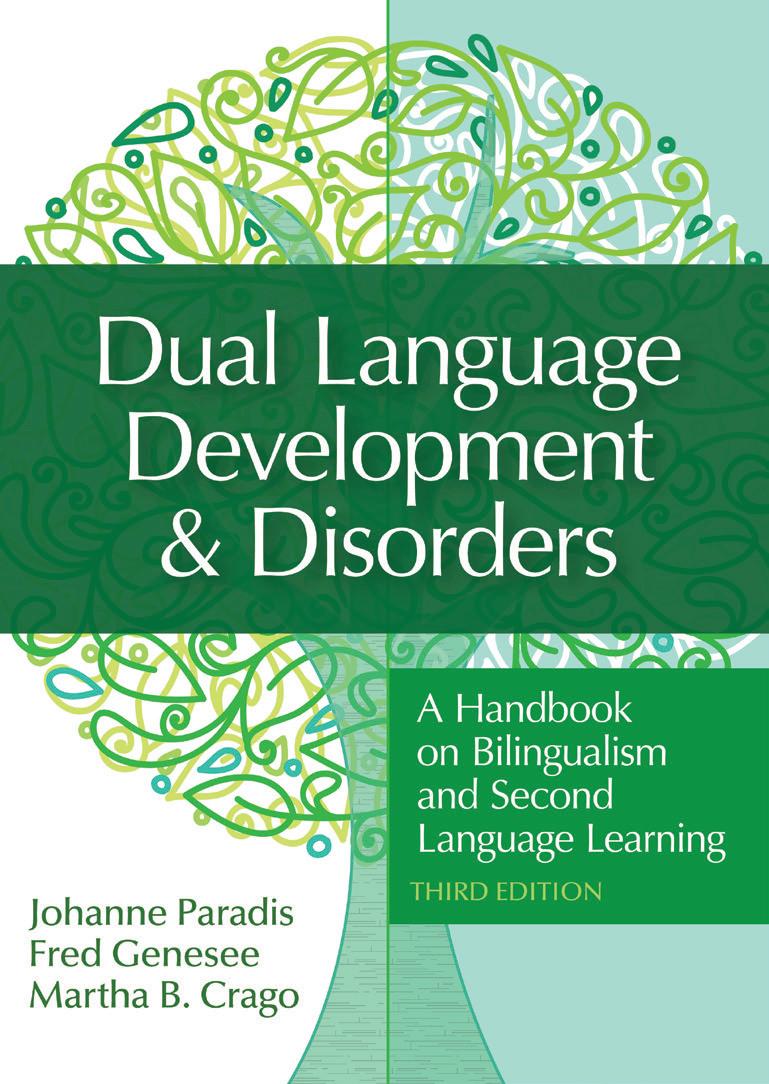
2 minute read
The Language–Neurocognition Connection
NEW
ORDER EXAM COPY

CONTENTS
I. FOUNDATIONS 1. Introduction 2. The Language–Culture Connection 3. The Language–Neurocognition Connection II. UNDERSTANDING BILINGUAL AND SECOND
LANGUAGE DEVELOPMENT 4. Language Development in Simultaneous Bilingual
Children 5. Code-Mixing in Bilingual Development 6. Second Language Development in Children 7. Heritage Language Development in Children 8. Language Development in Internationally-
Adopted Children 9. Schooling in a Second Language III. DUAL LANGUAGE AND DISORDERS 10. Language and Communication Disorders in
Bilingual Children
Appendix: The Normal Curve and Related
Concepts 11. Reading Difficulties in Bilingual Children
Dual Language Development & Disorders
A Handbook on Bilingualism and Second Language Learning, Third Edition
By Johanne Paradis, Ph.D. (University of Alberta), Fred Genesee, Ph.D. (McGill University), & Martha B. Crago, Ph.D. (McGill University)
”An exemplary book that fully captures the state of the field, is well-written for varied audiences, and impactful in its description of findings for practice and policy.”
— Sandra Barrueco, Ph.D., The Catholic University of America
Prepare SLPs and educators to support the growing population of dual language learners with the third edition of this bestselling textbook— developed by three influential experts on bilingual language development and aligned with Head Start guidelines on cultural and linguistic responsiveness.
Updated with the latest research and recommended practices, this text gives a broad audience of future professionals the clear and comprehensive information they need to promote positive outcomes for young dual language learners and make informed decisions about assessment and intervention when a disorder is present. Your students will get up-to-date guidance on a wide range of key topics, including recognizing the typical stages of second language learning, supporting development in both languages, distinguishing a language delay from a disorder, planning culturally appropriate interventions, addressing reading disorders in bilingual children, and more. New and enhanced student-friendly features make this edition even more engaging and practical, and a robust new package of online support materials will help faculty members use the book effectively in their courses.
WHAT’S NEW: • New chapter on supporting heritage language development in children with immigration backgrounds • Important updates throughout the book on best practices and recent research findings from the field • Updated student-friendly features, including learning outcomes at the start of each chapter, tables and figures that illustrate key concepts and research, and Voices from the Field text boxes • Two downloadable parent questionnaires to help SLPs gather critical information when working with culturally and linguistically diverse children • New online companion materials: discussion questions and class activities for each chapter, plus a final integrative course project




